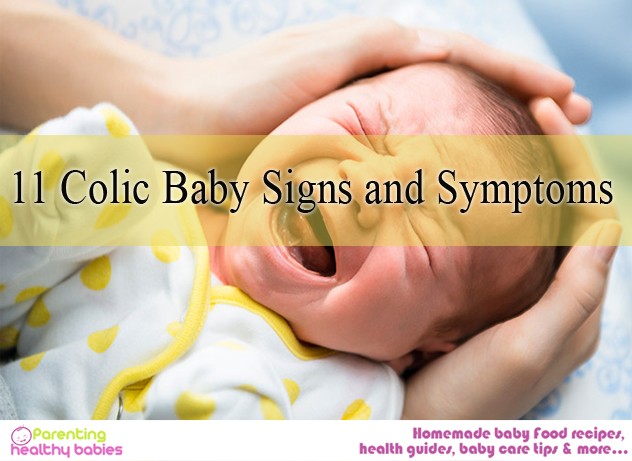So, your baby is crying nonstop and you do not know why. New moms are bound to be overwhelmed by the slightest of discomfort their babies exhibit. If your baby is particularly restless, the odds are he must be suffering from colic. Read on to know signs and symptoms that confirm your baby does have colic,
You’re just getting used to your newborn and his schedule when a few weeks later, he wails at ear-splitting levels, has clenched fists, throws his legs about and grows red in the face. You’re shocked, disturbed and anxious, not knowing what to do. Anything that you do to calm him down fails and you think this is an isolated incident–but no, it happens every night. What is this after all? Colic: that’s the answer.
Read More: 11 Natural Remedies for Calming a Colic Baby
Symptoms of Colic
If you’re unsure if your baby has colic, thumb down these 11 signs and symptoms to know if your baby experiences the same signs and symptoms:
1. Intense crying
If your baby is colicky, he will cry intensely and until he’s red in the face. As a parent, you won’t know what to do to comfort him. His face will be red and flushed and you’ll find him crying at the same time each day, usually in the late afternoon or evening. Each bout of crying will last for a few minutes or can go on to longer periods. He may begin crying out of the blue and for no known reason.
2. Crying often
Colicky babies cry excessively and persistently for many hours each day, for many days of each week. They are also fussy and irritable. Since babies cry a lot, parents may not be able to whether the baby is in pain or whether this bout of crying is normal.
3. Pattern of crying
Whether a baby has colic or not, they tend to cry a lot in the first three months of life than later. Normally, a two-week old baby cries two hours a day. This increases to three hours a day by the time he grows to six weeks and then falls to one hour a day by the time he’s three months old.
To determine whether a baby cries because he’s colicky or not, the 3 x 3 x 3 rule is used. Also called Wessel’s rule of threes, a baby who isn’t colicky will not:
- Cry for three hours or more a day
- Three or more days each week
- Cry for three weeks or more upto the age of six months
4. Baby’s crying screams
Babies that cry due to colic pain let out a piercing scream– a high-pitched one that goes on for many hours in the evening, often after a meal. Babies continue to cry, though their parents try every trick in the book to console them but fail.
5. Baby’s posture
When babies cry out of colic pain, their fists are tightly clenched. Their stomach muscles are tensed, knees drawn up to the stomach and the back arched. Usually, the baby takes on one of the following two postures while crying excessively:
- Posture 1: The baby pulls his legs towards his stomach. His fists are clenched, he has a frown on his face and his face is red and flushed.
- Posture 2: Here, the baby arches his back and stretches his legs.
6. Stomach gas
While crying, babies may pass gas since their stomachs are enlarged due to excessive stomach gas.
7. Sleeping
Babies with colic sleep irregularly and their sleep is often disturbed due to their episodes of crying
8. Feeding
With bouts of excessive crying, babies’ feeding could be disturbed and interrupted. However, the quantity of food a baby eats per day is not affected.
9. Wind
While crying excessively, the baby will also pass wind.
10. Mild to severe intensities
Some babies have mild symptoms of colic, while others have more chronic symptoms.
11. At peace between two episodes
If a baby is colicky, he will be peaceful during episodes. However, he will turn restless and fussy and cry for a definite length of time every day. If your baby is fussy at a specific time of the day, he will calm down for the rest of the day. On the other hand, if a baby is usually fussy, he could perhaps be experiencing another problem. Speak to his doctor about this.
Conclusion
If you think the baby’s crying may be the result of an injury or fall seek medical attention. If you notice any change in the baby’s general behavior, eating habits or sleeping patterns that concern you, ask your doctor or nurse for advice.
